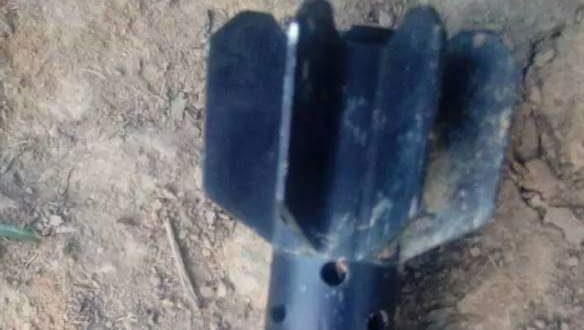Representatives from the Burma Army said they do not take responsibility for the death of one child and the injuring of two others hit by artillery shell splinters on Saturday in Puwang village in Muse Township, northern Shan State, according to relatives of the victims.
Six shells hit the village at around 6:10 a.m., killing a nearly two-year-old girl named Mang Shang Zung Myaw and injuring two boys, aged five and six, in the thigh and stomach; they are now being treated in a hospital across the border in China. Locals blame the Burma Army for the attack.
A village resident, and relative of the victims, said that they lived close to military troops. “We were preparing food at six in the morning when we heard the sound of explosions,” she said. “We went out and saw the children hit by artillery fire—they are all my relatives.”
The girl, who was hit by shrapnel in the shoulder and in the head, was buried in the village on Sunday. She is the only daughter of the family who are in “deep mourning,” according to Ying Sau, a pastor of the village. The family home was destroyed in the explosion.
Ying Sau told The Irrawaddy on Monday that Burma Army troops came to the village and inspected the girl’s body and the pieces of artillery on Saturday afternoon. According to Ying Sau “they said it is not their weapons.” The Burma Army was unavailable to comment at the time of press.
Lagwi Bawm Lang, one of the two injured Kachin boys, is in intensive care at China’s Mangsi Hospital in Yunnan province after his stomach was ripped open by shrapnel.
Mary Tawm of local relief agency Wunpawng Ninghtoi spoke with the boy’s doctor at the hospital and told The Irrawaddy that “the operation on the boy has been completed but we will have to see if he recovers, as he has nine holes in his intestines and doctors are worried about infection.”
Mary Tawm said that the estimated medical cost is between 20,000 and 50,000 Chinese yuan (US$3,000-7,500). According to the relief group helping the victims, the boy’s family will need support to help pay the medical costs.
The Burma Army’s use of heavy artillery shelling is common in the conflict zones of Kachin and northern Shan State.
UNICEF Myanmar released a statement Monday expressing concern over the incident. “Conflicts take a high toll on children in Myanmar,” said Bertrand Bainvel, UNICEF representative to Myanmar. “All parties to the conflict must keep children out of harm’s way.”
One Puwang resident said that three days prior to Saturday’s shelling, Kachin Independence Army (KIA) troops had been near the village, and speculated that this had attracted the attention of the Burma Army. Now, Burma Army troops are deployed in the area, which limits movement for locals, he said.
Lt-Col Naw Bu, spokesperson of the KIA, said that fighting had not occurred in the area prior to Saturday’s shelling. KIA Brigade 4’s Battalion 36 is based in the area.
Fighting has been ongoing since September in KIA controlled Waingmaw Township in Kachin state and other areas in Shan State North. In late September, the Burma Army carried out airstrikes in these areas.
Also on Saturday, the Burma Army and KIA continued to clash in Nhkram, which is about three kilometers away from the Myitkyina-Bhamo highway.
The Kachin public has increased calls for the immediate end to Burma Army operations in Kachin areas. The Kachin Women’s Peace Forum on Saturday said that the peace process can only proceed if the Burma Army halts their offensives.
Thousands of Kachin residents filled the Manaw festival grounds in the state capital of Myitkyina on Monday morning to campaign for peace and to call for ongoing aid to displaced persons. They were restricted from marching in the town without prior permission, so another official march is planned for Thursday.
The KIA-affiliated Kachin Peace Creation Group (KPCG), which acted as mediators between the KIA and Burma Army under the previous government, sent a letter to State Counselor Daw Aung San Suu Kyi, who is chair of the National Reconciliation and Peace Center, and Dr. Tin Myo Win, the chair of Burma’s Peace Commission, appealing for an end to the conflict.
Lamai Gum Ja of the KPCG told The Irrawaddy, “I cannot understand these offensives while we are being told to move toward national political dialogue.” He said in the letter that ongoing fighting would undermine the Union Peace Conference, taking place once every six months since the first talks in late August this year.
Nang Lwin Hnin Pwint contributed to this report.

















